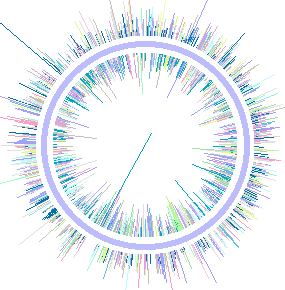Phylogenetic Genomics and Genomic Phylogenetics
Pacific Symposium on Biocomputing 2002
Kauai Marriott Resort and Beach Club, Hawaii
January 3-7, 2002
This session will explore the natural partnership between the co-evolving
disciplines of phylogenetics and genomics.
Genome structure and function analyses can be strengthened through examining
evolutionary history. Phylogenetics is a primary source for methodologies to
facilitate these investigations. The analysis of evolutionary history is
similarly empowered by a genomic perspective. Phylogenetic systematics
increasingly draws upon genomics, both as a vast source of relevant data and as
subject matter.
CALL FOR PAPERS
We are currently soliciting papers on subjects in these areas. Manuscripts
will be peer-reviewed in a rapid process as indicated in the timeline below.
Acceptance will be based on quality and relevance to the session. A subset of
the accepted papers will be selected for oral presentation.
This list of relevant topic areas is not intended to be exhaustive. Please
contact one of the session cochairs if you have a paper topic you would like to
suggest and submit.
- What makes phylogenetic analyses genomic?
In an effort to be associated with the genomic rage, many geneticist and
evolutionary biologists are describing their work as genomic in scale. However,
the number of researchers actually using entire genomes in phylogenetic
analyses is small, and many researchers are unlikely to ever have access to
whole genomes for the organisms they study. We believe that some discussion of
what exactly is meant by "phylogenomic" analysis is required if we
are to continue to make advances in this field.
Sample topics:
- Phylogenomics: a buzz word for comparative genetics?
- Phylogenetic analyses of large data sets
This topic covers the generation, assembly, and curation of large amounts of
data as well as empirical examples where large data sets are subjected to
phylogenetic analysis. Computational methods developed to overcome problems
associated with analyzing large numbers of taxa are also solicited.
Sample topics:
- assembly and management of large data sets
- methodological and algorithmic considerations associated with analyzing
large data sets
- high throughput approaches to phylogenetics
- studies using extremely large taxon samples in both pure research and
applied settings
- Whole Genome Analyses
Most comparative studies today that include whole genomes focus necessarily on
microbial organisms. These systems provide a model for larger, more complex
genomes, and have already begun to shed light on many areas in molecular
evolution. This topic is intended to bring together those researchers doing
truly genomic scale comparative analyses with other investigators working in
systematics and computer science.
Sample topics:
- whole genome approaches: advances and obstacles
- applications of comparative genome analysis to solving problems in
molecular evolution
- using microbial genomics to diagnose and classify organisms, including
previously unknown forms of life
- The Role of Phylogenetic Methods in Analyses of Gene Expression
Profiles
Gene expression data can now be collected rapidly for thousands of genes using
DNA microarray technology. The last two years have seen an explosion of
microarray data being applied to several areas of biology. The methods of
analysis are still in the early stages of development. However, many high
profile studies have already applied phylogenetic methods to analyses of
expression data. Here we seek to promote discussion of some of the issues that
arise when one applies phylogenetics to expression data. The goal is not to
simply present trees generated from large expression profiles, but also to
consider interactions between the genes in the analysis and to search for
improved diagnostic methods using the empirical examples.
Sample topics:
- tree building methods and the analysis of gene expression data
- phylogenetic analysis of cancer cell gene expression profiles
SUBMISSION INFORMATION
All PSB paper submissions must be submitted electronicly via email to Russ
Altman (altman@smi.stanford.edu).
We accept postscript, pdf and Microsoft Word format files. We can NOT accept
Tex files or other word processors. Please follow the paper formating
instructions available from
ftp://ftp-smi.stanford.edu/pub/altman/psb. Please note that all submissions
must be accompanied by an e-mail cover letter that specifies by which
(if any) specific session (e.g., this one) the paper should be reviewed. Please
also include a statement in the cover letter that the paper that contains
original unpublished results not currently under consideration elsewhere and
that all co-authors concur with its contents.
DATES AND DEADLINES
- Paper submissions due: July 16, 2001
- Notification of paper acceptance: August 20, 2001
- Camera-ready papers due: September 24, 2001
- Poster abstract deadline: November 5, 2001
- Meeting: January 3-7, 2002





